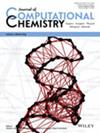Analyzing Many-Body Charge Transfer Effects With the Fragment Molecular Orbital Method
IF 3.4
3区 化学
Q2 CHEMISTRY, MULTIDISCIPLINARY
引用次数: 0
Abstract
A many-body expansion of charge transfer (CT) energies is developed for the fragment molecular orbital method. It is applied to decouple CT and mix terms in interaction energy decomposition analyses. Many-body charge transfer is graphically illustrated in the form of frontier orbital diagrams. The contribution of CT to molecular interactions is elucidated in the application of the method to water clusters, solvated ions, and polypeptide motifs.
用片段分子轨道法分析多体电荷转移效应
针对碎片分子轨道法,提出了电荷转移能量的多体展开方法。将其应用于相互作用能分解分析中CT项和混合项的解耦。多体电荷转移是用边界轨道图的形式图解的。CT对分子相互作用的贡献在水团簇、溶剂化离子和多肽基序的应用中得到阐明。
本文章由计算机程序翻译,如有差异,请以英文原文为准。
求助全文
约1分钟内获得全文
求助全文
来源期刊
CiteScore
6.60
自引率
3.30%
发文量
247
审稿时长
1.7 months
期刊介绍:
This distinguished journal publishes articles concerned with all aspects of computational chemistry: analytical, biological, inorganic, organic, physical, and materials. The Journal of Computational Chemistry presents original research, contemporary developments in theory and methodology, and state-of-the-art applications. Computational areas that are featured in the journal include ab initio and semiempirical quantum mechanics, density functional theory, molecular mechanics, molecular dynamics, statistical mechanics, cheminformatics, biomolecular structure prediction, molecular design, and bioinformatics.

 求助内容:
求助内容: 应助结果提醒方式:
应助结果提醒方式:


